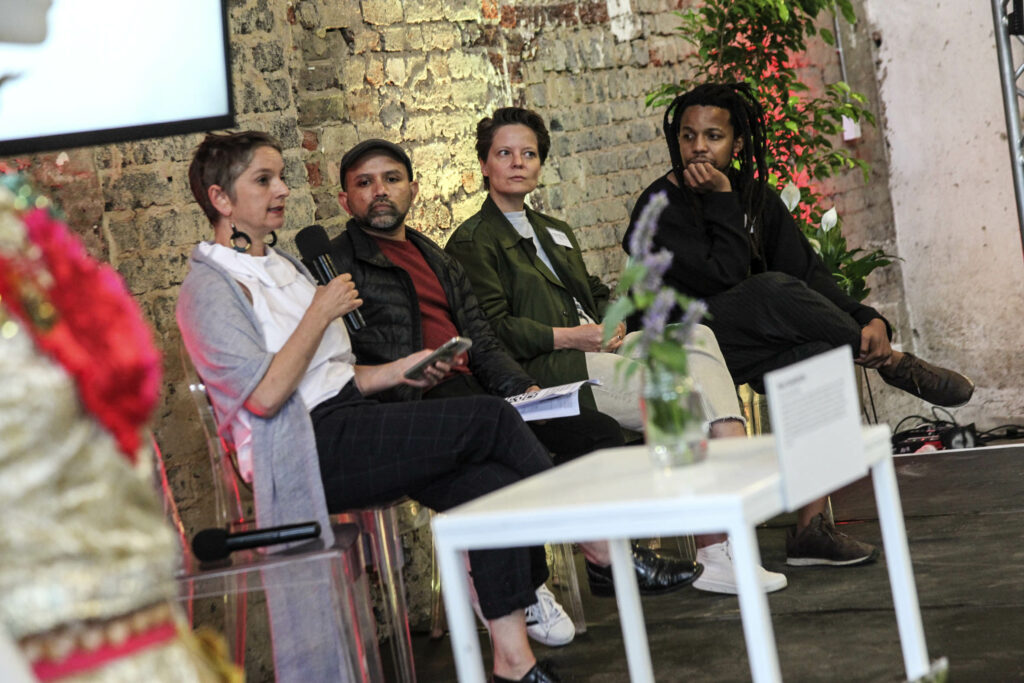On show: The Fashion Revolution exhibited clothes by the Swedish Institute at the Future of Fashion Symposium 2019. (Thabo Matsepane)
A fashion revolution could start in South Africa — if we look at the hard facts. With any revolution, there are those with an innate ability to ruffle a few feathers, all the while getting the work done, swiftly.
The Rewoven Co, a creative and bright trio of entrepreneurs passionate about sustainability and the circular transition of the fashion industry, has begun creating a conversation with fashion designers through The Future of Fashion symposium. The first symposium was co-hosted with the Swedish Institute and Team Sweden in Johannesburg in December last year.
During the symposium, Marcus Bergman, a sustainability strategist and the main speaker at the symposium, called on the design community to rethink ways of making clothes with more regard for issues of gender parity in the supply chain. In countries where the production of cotton is a primary economic source, the process of cotton separation is usually done by men while women are left home to maintain the household. This is a shocking fact given that the United Nations’ sustainable development goals include gender equality (goal 5).
 The future: Speakers at the Future of Fashion Symposium 2019 were (left to right) cofounder of African Fashion Research Institute Lesiba Mabitsela, designer Annegret Affolderbach, country coordinator of Fashion Revolution Cyril Naicker and founder of Twyg Jackie May. (Thabo Matsepane)
The future: Speakers at the Future of Fashion Symposium 2019 were (left to right) cofounder of African Fashion Research Institute Lesiba Mabitsela, designer Annegret Affolderbach, country coordinator of Fashion Revolution Cyril Naicker and founder of Twyg Jackie May. (Thabo Matsepane)
The global fast fashion industry is deeply connected to the systemic marginalisation of workers, more so black and brown women. And South Africa’s fashion industry is one marred by a history of exploitation.
This is one of the core problems that Esethu Cenga, co-founder of Rewoven Co. and her team members Lonwabo Mgoduso and Tshepo Bhengu are striving to eradicate. Dismantling the ways of the past can begin with a fashion industry that challenges consumers to think harder about the garments they purchase from retailers and their contribution to the compensation and treatment of black women.
Deeper questions need to be asked about how the textile value chain is involving designers and leaders of fashion conglomerates. Gone are the days of pursuing triple bottom-line performance at the cost of humanity.
The kind of revolution in the fashion industry is one that could involve society on a very basic level, with a single turn into circularity. It could foster a point of no return and insist on deepening the conversation about the sourcing and discarding of fibre. “The sorting of textile waste is pivotal in upcycling and recycling. The industry needs to commercialise the sorting of material,” Bergman said.
He spoke of the shallow response from the industry as a whole to sustainable methods of producing garments and the slow pace in wielding political and commercial power that would garner support and sustain a revolutionary, ethically-conscious fashion industry worldwide.
An ethically-conscious fashion industry could hold government leaders and fashion conglomerates to account regarding their commitment to buying locally manufactured textiles, contributing to curbing the damage that landfills have on our planet and continuing conversations about circularity, where inclusiveness and empowerment of women farmers and black small-holder cotton farmers is advanced. “Managerial leaders have been very brutal toward people, not only animals,”Bergman said.
In some ways, the consumer is more likely to lead this revolution. In all of fashion’s existence, the notion of consumption and waste go together. When we like an item, we buy it (at times on a whim; many times we do so in a deliberate attempt to be the first in line to own it). When we are no longer interested in the item, our first instinct is to discard it by either giving it away or throwing it into the trash. We have wardrobes full of garments, some pricey and others quite cheap. We may or may not need all of the items we own, for reasons that sustainability activists have called the biggest devastating consequences that we can no longer ignore.
What consumers do understand about the fashion industry is the retail experience; the sheer pleasure of purchasing a garment that could perhaps change an entire wardrobe. As much as we understand the consumers’ buying power, the awareness of the fashion industry’s effect on our natural resources is crucial in readjusting its linear business model to a circular one. The transition can turn out to be revolutionary for all concerned. In 2005, a major shift in global textile imports changed the clothing and textile industry, as a whole. This was a result of quantitative global quotas being abolished, creating an opportunity for retailers to source textiles anywhere in the world. This, in turn, affected the way local fashion designers source textiles for their collections, specifically cotton.
With 26 years of democracy and much of our creative industries still male and white, Rewoven, one of the few startups co-managed by a black young woman, sends a clear message by being a completely circular-minded company and assisting other fashion labels to do the same. Considering that 9% of the world’s population has no access to clean drinking water, the effects of a fast fashion industry are no doubt a cause for concern, whether one is a local fashion designer or a brand of quality fashion.
Erica de Greef, senior curator for fashion at Zeitz Mocca Museum and co-director of the African Fashion Research Institute, also spoke at the symposium. She says, “In a broader sense, fashion can influence politics, economics, ecology and ways of being in the world.”
In the long run, a circular business model may soon catch up to the ideals of a sustainable fashion industry and pull in much more revenue. For now, a small gathering of revolutionaries questioning the system is a start.